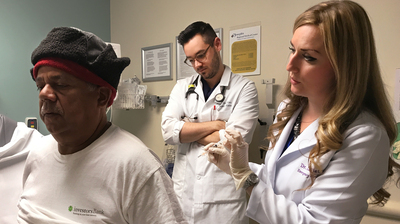Avoiding Post-Surgical Opioid Addiction
"If I could awaken them without any pain whatsoever, I was the slickest guy on the block, and it was a matter of enormous pride."
"It starts with patient expectations, and I think, over the years, patients have come to expect more and more in terms of, 'I don't want any pain after surgery', and it's an unrealistic expectation."
David Alfery, anesthesiologist
"I just wanted my patient not to be in pain, thinking I was doing the right thing for them and certainly not an outlier among my colleagues."
"But now looking back on it, I was putting them at significant risk of developing an addiction to those medications."
"[Now] We will treat the pain, but you should expect that you're going to have some pain. And you should also understand that taking a narcotic [dose so high] that you have no pain, really puts you at risk of becoming addicted to that narcotic."
Mike Schlosser, chief medical officer, HCA division, U.S.A.
"I've had people tell me that the constipation [resulting from opioid use] was way worse than the kidney stone."
"There are lots of other complications from opioids -- nausea, itching, hallucinations, sleepiness. We really need to treat these drugs with respect and give people informed consent. And let people know these are not benign drugs."
Valerie Norton, head, pharmacy and therapeutics council, Scripps Health System, San Diego
"You don't want to portray the fact that you're not going to treat people appropriately."
"We really do have a lot of responsibility and culpability in this burden, and so we have to make sure we do whatever we can to stem this tide and turn the ship in the other direction."
John Young, national medical director of cardiovascular services, LifePoint Health
 |
| ER reduces opioid use by more than half with use of dry needles and laughing gas. NPR |
On the street I live on, many of the residents in this middle-class suburb of Canada's national capital have had quite serious surgery. There are two people I know rather well, the elder of whom underwent double-bypass heart surgery and mitral valve replacement. At the time of the surgery he was 78, and in very good physical health, other than that at some time, unknown to him, he had suffered a "silent" heart attack that damaged his heart. The other, ten years younger, the year previous had had triple bypass open-heart surgery.
The younger man took longer to recover than the older man. And to this day he uses painkillers each and every day to enable himself to function. The older man, now 81, has fully recovered, and did so fairly speedily. After his open-heart surgery he was given Fentanyl and was later switched to extra strength Tylenol for his return home after hospital discharge. He used Tylenol for a few days then decided he could live with discomfort while healing and set aside painkillers altogether. He soon discovered that the pain was ebbing and eventually faded altogether.
Not everyone is that determined to bypass the potential for addiction to painkillers. North America, with its advanced medical technology and life-saving surgeries has seen a calamitous surge in opioid addiction, not only among recreational drug users who access their drugs illicitly, but among ordinary people who would never otherwise have dreamed they would become addicted to prescription pain killers following surgery and pain avoidance. The numbers of people dying from drug overdoses has overwhelmed communities.
And street trade in Fentanyl and Carfentanil has overwhelmed local health units' capacity to treat drug overdoses. It wasn't long before the finger of blame was pointed directly at doctors at every level prescribing painkillers for their patients, failing to monitor them, and to ensure that dosages fit the circumstances. Medical professionals are now, in the face of mounting concerns over preventable deaths, playing catch-up in assuming responsibility for their earlier laissez-faire attitude over drug prescriptions.

Even dentists have come to realize their part in the all-too-casual prescription of painkillers. Pain treatment, simply put, was institutionalized; patients were informed that yes, they would be undergoing surgery, but not to worry, the pain would be kept under control. Dr. Schlosser, for example, a spinal surgeon working out of an HCA flagship facility in Nashville, practised some of the most painful surgical procedures in medicine, such as correcting back curvature. Starkly aware of the pain his surgery caused, he had been determined to soothe it.
Now, after having studied a vast trove of data, he discovered that orthopaedic and back surgeries' greatest risk is addiction, not infection or other types of complications resulting from surgery. The larges private hospital chain in the U.S. has embarked on a new protocol prior to surgery which includes a type of surgeon-patient conversation he had never imagined having in practising medicine. Informing the patient about to undergo surgery that yes, some level of pain would be controlled, but ultimately it would not be possible to smother it all.
Surgeons must now address the issue of pain resulting from surgeries with their patients pre-surgery. Sparing use of opioids is now the order of the day, and to succeed with this new protocol the hospital must attempt other avenues to finding the most effective combination of non-narcotic medicine while blocking nerves to pain. Post-surgery, it is the job of nursing staff to administer the practicalities of the new protocol.
If a post-surgical patient is observed capable of rousing themselves out of bed and walking and coughing without doubling over, it is an indication they may not require potentially addictive drugs, or high-dosage drugs. All this while being mindful of the need to avoid word-of-mouth warnings from patients who may not feel dreadfully impressed with a hospital where undergoing treatment has greater pain associated with its surgeries.
Labels: Drugs, Medicine, Pain Management, Surgery

0 Comments:
Post a Comment
<< Home